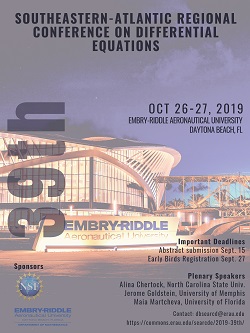Institution
Savannah State University
Abstract
A major challenge in the numerical treatment of space fractional reaction-diffusion equations is the presence of nonlocality issues, which generates computational and numerical difficulties that have not been encountered in the context of the classical diffusion equations. Moreover, in the presence of nonlinearities, these difficulties are amplified with the need for efficient and accurate stable numerical methods. In this talk, we will introduce an unconditionally stable fourth-order method both in time and space directions, which is capable of removing the stiffness issues related to the fractional-order derivatives. The performance of the method in terms of accuracy and computational efficiency has been investigated by testing it on three numerical examples, including Brusselator and Gray-Scott models. Comparison of the numerical results obtained via the proposed method, RK4 method and modified ETDRK4 method exhibited that the proposed method is computationally more efficient and reliable than RK4 and modified ETDRK4 methods.
An Efficient and Accurate High-Order Method in Application to Space-Fractional Reaction-Diffusion Systems with Nonhomogeneous Boundary Conditions
A major challenge in the numerical treatment of space fractional reaction-diffusion equations is the presence of nonlocality issues, which generates computational and numerical difficulties that have not been encountered in the context of the classical diffusion equations. Moreover, in the presence of nonlinearities, these difficulties are amplified with the need for efficient and accurate stable numerical methods. In this talk, we will introduce an unconditionally stable fourth-order method both in time and space directions, which is capable of removing the stiffness issues related to the fractional-order derivatives. The performance of the method in terms of accuracy and computational efficiency has been investigated by testing it on three numerical examples, including Brusselator and Gray-Scott models. Comparison of the numerical results obtained via the proposed method, RK4 method and modified ETDRK4 method exhibited that the proposed method is computationally more efficient and reliable than RK4 and modified ETDRK4 methods.


Comments
View Parallel Session